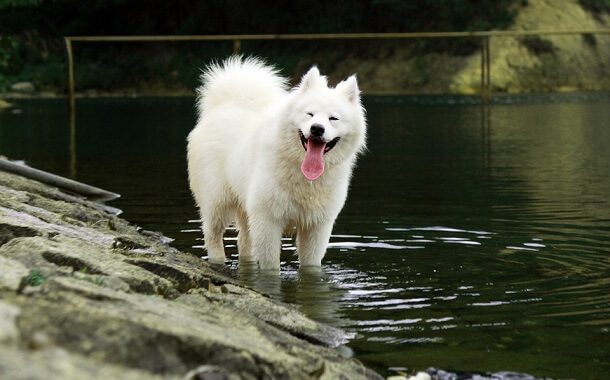The Cost of Samoyed
Last Updated on December 27, 2023
Written by CPA Alec Pow | Content Reviewed by ![]() CFA Alexander Popinker
CFA Alexander Popinker
The Samoyed dog is part of the huge family of Spitz dogs, dogs considered primitive. Originally from Russia, from the Siberian tribe called Samoyed, they were used to pull sleighs and were also called “Bjelkier”, which in free translation means “whitish”. It is one of the pure Nordic breeds, such as the Husky, Malamute, or Chow Chow, which appeared at least 3000 years ago.
In the United States, it arrived in the early 1900s, being brought by merchants who sold furs. It is a domestic animal and at the same time a sled, hunting, and herding dog. With a strong, independent spirit, it will always try to be on its own and will make sounds similar to wolves from time to time. But it doesn’t bark often.
How Much Does A Samoyed Cost?
One of the distinguishing features of purebred dogs is the “Samoyed smile”, due to the slightly curved lips at the corners of the mouth. This is why these dogs cost so much. The average price of such a dog is anywhere between $770 and $2,550. These costs are influenced by many factors including:
- Age – the price of a Samoyed puppy is higher than the price of an adult dog.
- Bloodline – expect to pay a higher price for a champion bloodline as these dogs have the potential to become show dogs.
- Certified dog breeders – when buying from a certified dog breeder you have the guarantee that you will receive a top–breed dog, without any health problems, but you will pay a higher price.
- Gender – because they have the ability to reproduce, the Samoyed females cost more. Though, a male capable to produce quality offspring is also valued.
Samoyed details
Males reach a height of approx. 23 inches and a weight of approx. 66 pounds. Females reach a height of approx. 20 inches and weigh about 55 pounds. Samoyeds are compact dogs with impressive endurance. Their muscular body has silky and elegant appearance. The tail is raised and has a curved shape – typical for sled dogs – and is held above the back.
However, Samoyed eyes are not blue or multicolored, but predominantly dark in color.
The life expectancy of a Samoyed is 12 to 14 years.
What are the extra costs?
Large dogs, in addition to having a large appetite, need a varied nutritional ratio, which includes minerals and vitamins, compared to smaller dogs. The Samoyed may be prone to bloating and stomach problems; smaller and more frequent meals can help reduce this risk. Be prepared to spend anywhere between $15 and $75 for your dog’s food.
Samoyed dogs shed a lot when the seasons change, which is why their fur must be brushed and combed periodically to remove loose hairs. They don’t like water very much, because they don’t like to have wet fur, so they have to get used to bathing sessions from an early age. After bathing, the dog’s fur should be completely dry, and this process can be time-consuming. It does not emit the specific smell of the wet dog. Its teeth should be cleaned every few days with the help of a special toothbrush for dogs, and nail trimming should be done monthly. So, you should budget around $100 for grooming every few weeks.
You might also like our articles about the cost of a Caucasian Shepherd, Alaskan Malamute, or an Akita.
Unlike other dog breeds, the Samoyed is more prone to health conditions. Among the diseases that can occur in this breed are the following: hip and shoulder dysplasia, aortic stenosis, retinal arthropathy, gastric torsion, hypothyroidism, epilepsy, allergies. That’s why regular vet visits are so important. The price of a regular physical examination is anywhere between $60 and $70, while a vaccine might set you back around $20. Also, for the annual teeth cleaning you have to budget around $330.
Even though optional, it is recommended to have health insurance for your Samoyed. The cost of an insurance plan starts at $28 and goes up to $75.
Samoyed dogs are happy, energetic dogs that love people. They are excellent with children and always have the desire to play in the yard, especially when it is snowing. In order to keep them active, you should buy them some dog toys that cost around $10 each.
Other necessary accessories for your pet are represented by the leash that costs anywhere between $12 and $30 and the dog collar that costs anywhere between $10 and $30.
There are also other extra costs such as:
- Transport & shipping costs – if you need to have your new pet shipped be prepared for the shipping fees. For example, The Sweet Sammy Home would charge around $110, depending on the distance. On the other hand, some breeders might not charge for this service, but the cost of the Samoyed would be higher as the fee would usually be included in the price.
- Shelter Cost – when traveling you will need a kennel or a dog crate, so be prepared to pay anywhere between $20 and $340 for one, depending on quality, brand, and size. Moreover, it is recommended to buy a dog house for your pet, where he can rest. A dog house costs $90 to $280.
- Registration cost – The American Kennel Club charges a fee of around $35 for registering your Samoyed.
- Dog training – it is a necessary cost as Samoyeds tend to be stubborn without it. The prices for dog training are variable, depending on its type – whether if it is done in private or in a group setting. For instance, complete private training would cost around $1,250, while group training would cost you anywhere between $160 and $300.
Important things to consider
 The Samoyed is generally a friendly, sociable and devoted dog. He protects his home; no intruder will enter without being heard. He likes to be included in all family activities and can become destructive and noisy if left alone for too long or bored. He likes to dig and is very good at escaping, so yard fencing is essential. They need to be socialized from an early age, especially with cats and other pets in the house. They can be very noisy.
The Samoyed is generally a friendly, sociable and devoted dog. He protects his home; no intruder will enter without being heard. He likes to be included in all family activities and can become destructive and noisy if left alone for too long or bored. He likes to dig and is very good at escaping, so yard fencing is essential. They need to be socialized from an early age, especially with cats and other pets in the house. They can be very noisy.
The Samoyed dog breed needs quite a lot of movement, both on and off the leash. They have an instinctive urge to pull on a leash; however, they may be trained to walk with you or you may use a head harness. An adult Samoyed needs about two hours of exercise daily.
Large dogs, in addition to having a large appetite, need a varied nutritional ratio, which includes minerals and vitamins, compared to smaller dogs. The Samoyed may be prone to bloating and stomach problems; smaller and more frequent meals can help reduce this risk.
Samoyed dogs are not allowed to eat pork and offal, poultry or pork bones, sausages, fries, fatty cheeses or other foods with preservatives, chocolate, peanuts or other sweets.
After the meal, the dog should rest for half an hour. Hydration is essential for Samoyed, which is why it constantly needs fresh water.
How can I save money?
You can save money by adopting a Samoyed instead of buying. If you are in luck you might find one at a local adoption center, rescue group or shelter. Also, you can search on the Internet as there are many organizations that help the abandoned dogs to find a new home, like AdoptAPet.com


Leave a Reply
Want to join the discussion?Feel free to contribute!